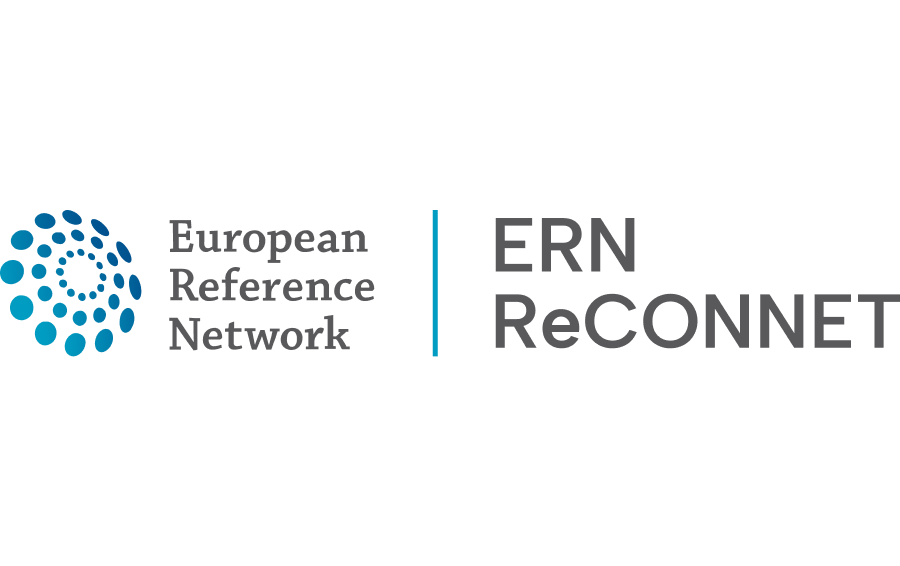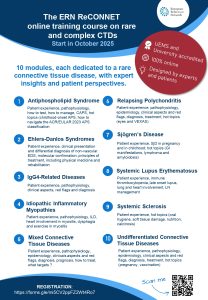ERN ReCONNET accredited e-Learning Course on Rare and Complex Connective Tissue Diseases – UEMS accredited
Rare and complex connective tissue and musculoskeletal disorders often present with atypical clinical features, making diagnosis and management particularly challenging.
To address this, ERN ReCONNET offers a comprehensive accredited online training program designed to equip physicians and healthcare professionals with the specialized knowledge and skills needed to recognize and manage these conditions effectively.
Through 10 focused modules, this e-learning course enhances clinical understanding and promotes multidisciplinary coordination by combining expert insights with valuable patient perspectives—ultimately aiming to improve care quality and outcomes for individuals living with these rare and complex diseases.
Course Highlights:
- Explore the latest in diagnosis, treatment, and management of rare CTDs.
- Gain perspectives from patients living with these conditions.
- Learn from leading specialists and clinicians across Europe.
- 100% accredited online format designed for healthcare professionals and students.
Target audience:
Designed for healthcare professionals, researchers and trainees specializing in the study and treatment of rare and complex diseases of the connective tissue and musculoskeletal system.
Course organisation:
At ERN ReCONNET, we understand that healthcare professionals and students have demanding schedules.
That’s why this accredited course is offered in a flexible e-learning format, allowing participants to study whenever and wherever it suits them best.
Learners can choose which modules to complete at their own pace, with each module concluding with a multiple-choice quiz to assess their understanding. After successfully completing all modules, participants are eligible to take the final exam.
Accreditation
The ERN ReCONNET e-Learning Course on Rare and Complex Connective Tissue Diseases is accredited by the European Accreditation Council for Continuing Medical Education (EACCME®), an institution of the European Union of Medical Specialists (UEMS).
Upon successful completion of the course, participants will be awarded 37 European CME Credits (ECMEC®) as formal recognition of their achievement. A certificate indicating the total number of ECMEC® credits earned will be provided.
Course content:
Module 1. Antiphospholipid Syndrome
- APS Patient perspective – Silvia Aguilera
- Pathophysiology of APS manifestations in different organ domains – Marteen Limper
- How to test for and interpret the antiphospholipid antibody profile – Angela Tincani
- The management of thrombotic APS – Maria Tektonidou
- The management of obstetric APS – Laura Andreoli, Karen Schreiber
- Catastrophic APS – Ricard Cervera
- Hot/Difficult topic #1: Childhood-onset APS – Gabriele Simonini
- Hot/Difficult topic #2: How to navigate the ACR/EULAR 2023 APS classification criteria – Stéphane Zuily
Module 2. Ehlers-Danlos Syndromes
- Joint hypermobility and hypermobility spectrum disorders – Marco Castori
- Clinical presentation of non-vascular Ehlers-Danlos syndromes – Karelle Benistan
- Clinical differential diagnosis of non-vascular Ehlers-Danlos syndromes – Serwet Demirdas
- Molecular diagnostics of non-vascular Ehlers-Danlos syndromes – Marco Castori
- Diagnostic odyssey: a patient’s perspective – Charissa Frank & Eva Colado
- Overview on the applications of physical medicine in generalized hypermobility spectrum disorder and non-vascular Ehlers-Danlos Syndromes – Claudia Celletti
- Principles of treatment of the instable shoulder in the hypermobile individual – Nicola de Gasperis
- Principles of treatment of the hypermobile spine – Paolo Fraschini
- Application of intensive rehabilitation programs in people with symptomatic joint hypermobility – Luigia Brugliera
- Principles of effective drug use in joint hypermobility-related pain – Alberto Sulli
- Therapeutic odyssey: a patient’s perspective – Eva Collado
Module 3. IgG4-Related Diseases
- IgG4 disease Patient perspective – José Ballarin
- Pathophysiology – Emanuel Della Torre
- Clinical aspects and red flags – Tobias Alexander
- Diagnosis – Fernando Martinez-Valle
Module 4. Idiopathic Inflammatory Myopathies
- Patient perspective – Olga Drapalova & Silke Schlueter
- Interstitial lung disease – Antonella Notarnicola
- Cardiac involvement in myositis – Louise Diederichsen
- Exercise in myositis – Helene Alexanderson
- Dysphagia in IIM – Bendix Labeit
Module 5. Mixed Connective Tissue Disease
- Patient perspectives – Vera Guimares, Magdalena Ciupera
- Evolving views and controversies over the nature of MCTD – Silvia Bellado Randone
- Physiopathology of MCTD – Ewa Kuca-Warnawin
- Epidemiology – Marzena Olesinska
- Clinical aspects and red flags – Paola Triggianese
- How to perform the diagnosis? – Carmen Pizzorni
- Prognosis in MCTD – Cristina Pamfil
- Monitoring patients with MCTD in routine clinical practice – Marzena Olesinska
- How to treat? What are the targets? – Benjamin Chaigne, Kevin Chevalier
Module 6. Relapsing Polychondritis
- Patients’ experience – Camelia Bucsa interviewed by Francesca Crisafulli
- Pathophysiology of RP – Laura Damian
- Epidemiology and clinical aspects with red flags – Simona Rednic
- How to perform the diagnosis? – Oliver Sanders
- How to treat? – Oliver Sanders
- Hot topics: The eyes in RP – Laura Damian
- Hot topics: Red flags for VEXAS in RP patients – Raquel Faria
Module 7. Sjögren’s Disease
- Patient perspectives – Joyce Koelewijn-Tukker, Ana Vieira and Linda Stone
- SjD in Childhood – Edoardo Marrani
- SjD and Pregnancy – Grégoire Martin de Fremont
- Lymphoma – Gaëtane Nocturne
- Amyloidosis – Luca Quartuccio
- Gastro-intestinal manifestations – Inês Figueireido
- Oral manifestations – Marjolaine Gosset
Module 8. Systemic Lupus Erythematosus
- Patient perspective (thrombopenia) – Cathrina
- Thrombocytopenia – Eric Hachulla, Louis Terriou
- Late onset lupus – Noémie Gensous
- Patient perspective (late onset lupus) – Claude Bisonnet Bonneau
- Lung manifestations – Carlos Vasconcelos and Inês Furtado
- Lupus myocarditis – Marc Pineton de Chambrun
- Lupus nephritis – Frederic Houssiau
Module 9. Systemic Sclerosis
- Calcinosis – Corrado Campochiaro, Aslıhan Avanoğlu
- Oral Hygiene in SSc – Sophie Jung
- Patient perspective (soft tissue damage) – Lorraine McKenzie
- Patient perspective (calcinosis) – Greta Causa
- Soft tissue damage – Michael Hughes
- Using nutrition to help manage GI symptoms in SSc – Elizabeth Volkmann
Module 10. Undifferentiated Connective Tissue Disease
- Patient perspective – Ramona Luciu
- Physiopathology – Silvia Piantoni
- Epidemiology and clinical aspects with red flags – Margarida Rocha
- How to perform the diagnosis? – Marta Mosca
- How to treat? What are the targets? – Edoardo Marrani, Massimo Radin
- Hot topics: UCTD and Vaccination – Patricia Carreira
- Hot topics: Pregnancy in UCTD – Luca Iaccarino
Registration:
Free and open to interested participants who are affiliated with one of the ERN ReCONNET Full Member centres or Affiliated Partners centers. Sign up via the registration form : Click here to register to the course




